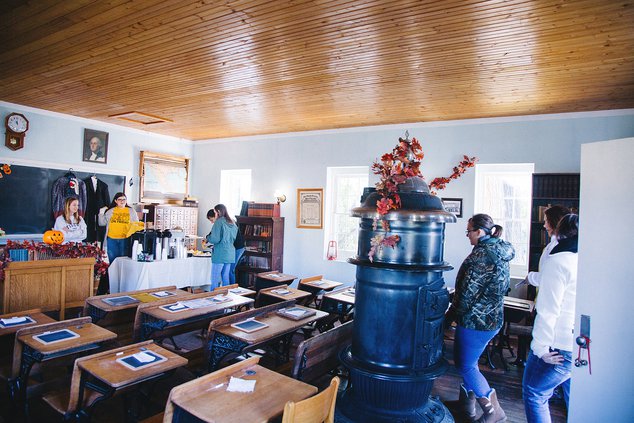HAYS – Bricks-and-mortar education was the only choice for formal instruction back in the days of one-room schoolhouses. In today’s digital age, students can study from anywhere at any time.
Alumni of Fort Hays State University got to enjoy a taste of both on Homecoming weekend 2019 as they gathered to help FHSU’s College of Education celebrate its first ever all-college reunion.
The reunion began on an unseasonably cold morning with the 40-year anniversary rededication of the Plymouth Schoolhouse. The crisp walk across campus to the schoolhouse gave people a little taste of what students had to endure back in the days of walking to school on the prairie.
The limestone building, built in 1874 in Russell County, was disassembled and moved to the FHSU campus in 1979. Tours, which include a multi-media show about its historical significance, are available year-round by contacting Ann Noble at 785-628-5449.
Alumnus Marcy Aycock from Conway Springs, who helped plan the College of Education reunion, thought an anniversary celebration of the schoolhouse would be a perfect part of the weekend because of the historical significance.
Friday of Homecoming was a great day to be a Tiger for Aycock, who graduated with a degree in art education in 1974. The new Center for Art and Design, completed in August, was dedicated that day. She was mesmerized with her tour of the building.
Her favorite event, though, might have been Saturday morning’s breakfast with fellow alums.
“What a great time to see a lot of people,” she said, “and to make connections as we support the great university that we love so much.”
Retired professors Nancy Vogel and Allan Miller are long-time supporters of FHSU.
They helped coordinate the moving project of the Plymouth Schoolhouse back in ’74 and returned to campus for the 2019 Homecoming festivities. They kicked off the rededication ceremony by giving the audience a trip down memory lane with a simultaneous history lesson.
The Vogel-Miller tandem talked about fundraising efforts and the challenges faced in the school’s 45-mile trip to its present home next to Big Creek, across the street east of Tomanek Hall.
Vogel referred to the classic children’s book, “The Little Engine That Could,” while describing the moving process and what the building says to us.
The little engine’s task was to pull a large train up a long, steep hill.
“I think I can. I think I can. I think I can,” she said, reading what the little engine kept repeating to itself. “With optimism and hard work, we too can succeed just like the little engine that thought it could.”
That tenacity mirrors the spirit of Fort Hays State through the decades, says another graduate from the 1970s.
Keith Ballard was a first-generation college student from Kiowa who graduated with his bachelor’s in 1971, propelling him into a highly successful career in education. Ballard, now an endowed professor in the Education Leadership and Policy Studies Department at the University of Oklahoma-Tulsa, takes every chance he gets to laud his life-changing experience at FHSU.
“Fort Hays State had a well-deserved reputation as being sensitive to the needs of all their students back then,” Ballard said, “and that hasn’t changed. Every single person at Fort Hays State was tuned in to the needs of every student. Their idea was – and is – that they are here to serve students, and they put students first.”
Visitors crowded in to tour the schoolhouse and talk about what a school might have been like back then. The pot-bellied stove, desks with ink wells, a bucket of drinking water with one dipper for everyone’s use, and well-worn books on a shelf are a stark contrast of today’s educational scene.
Nonetheless, Ballard insists that the school’s mission has never changed.
“A different time,” he said, “but still the same Fort Hays State culture.”





